Community-Based Solutions
Establishing Sustainable Community-Based Income Alternatives in Timor-Leste and the Philippines
As a result of the changes brought about by the COVID-19 pandemic, the Seagrass Ecosystem Services (SES) Project has been seeking innovative ways to adapt its implementation, particularly in light of the international and in-country travel restrictions.
The SES Project is being carried out in five southeast Asian countries – Indonesia, Malaysia, the Philippines, Thailand and Timor-Leste – and managed by CMS Dugong MoU Secretariat in Abu Dhabi, UAE.
To keep communication and learning open between our partners, the CMS Dugong MoU Secretariat has organized a series of online knowledge exchanges. The exchanges are an informal and conversational way for partners to gather and share information around a set theme. Each session is recorded and available to listen to via the Dugong & Seagrass Hub.
The first in the series of knowledge exchanges focused on successful models for diversifying coastal communities’ livelihoods and how these can catalyze community-led marine conservation. In this Knowledge Exchange, Stephanie Rowbottom of Blue Ventures Timor-Leste and Godofredo Villapando of Zoological Society London (ZSL) Philippines shared their experiences of establishing community-managed homestay associations, and community savings and credit associations.
A key goal of the SES Project is to provide opportunities for livelihood diversification, so coastal communities can gain access to alternative income streams, reducing their reliance on marine resources and improving their resilience. Equally, the project seeks to empower communities to protect and conserve their marine resources by developing sustainable and locally managed mechanisms for marine conservation, particularly for seagrass meadows.
Our partners in Timor-Leste and the Philippines have been addressing these challenges by establishing lasting solutions for income diversification and financial security within the communities they work with.
The full recording and video of the discussion is available on the Dugong & Seagrass YouTube Channel
Coastal communities around the world are highly dependent upon marine resources to support their lives and livelihoods. But due to several factors, including a changing climate, the nearshore ecosystems they utilize to survive are now in severe decline, threatening the future security of the vulnerable communities who depend on them.
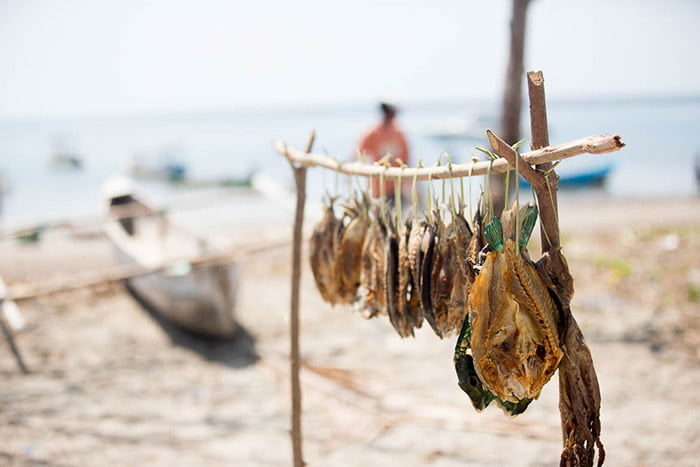
Community Homestay Associations: Blue Ventures, Timor-Leste
Blue Ventures, an international non-governmental organization working in community-led conservation, has supported the development of homestays in Timor-Leste since 2016. Homestays are a model of community-based tourism that offers tourists a unique opportunity to experience the daily life of a host family and to interact with the local community.
The Atauro Homestay Association (AHA), the first in Timor-Leste, was established with the assistance of Blue Ventures in 2016 and involved eight families from Atauro, an island just off the capital city of Dili. Since its establishment, the AHA has hosted 3,843 tourist nights and generated US$56,200 in revenue, and its members have participated in targeted training courses aimed at improving the homestay standards, including hospitality, health and safety, and food preparation. Anecdotal evidence indicates that, as a result of this additional income stream, participating families rely less on fishing to support their livelihoods, reducing pressure on local marine resources, and volunteer to join other Blue Ventures conservation activities, such as seagrass monitoring and beach clean-ups.
Typically family-run, homestays offer accommodation and related services, such as tour guiding, food and transport, as an alternative to hotels and resorts.
In October 2020, the Beto Tasi Homestay Association (BTHA) was established by ten families in the outskirts of Dili. The community leaders asked Blue Ventures to help them develop this initiative after seeing the success of the AHA; this was a very welcome opportunity for Blue Ventures to work with a new community in Timor-Leste and a chance to apply lessons learnt from working with the AHA.
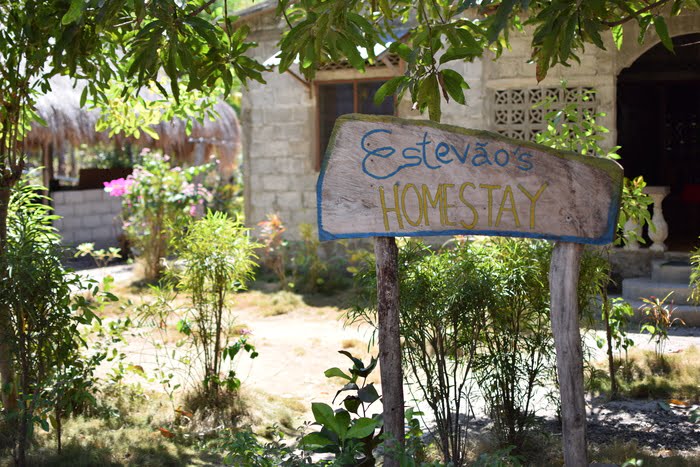
When establishing the AHA, the process of selecting homestay families led to some conflict and jealousy between community members, so when replicating the programme in Beto Tasi, the community leaders and Blue Ventures took great care to inform and include the whole community in the initial consultations.
The consultations, which due to COVID restrictions took place as several staggered events, were an opportunity to introduce the idea of homestays as a form of community-based tourism, and to explain the importance of reducing dependency on fisheries by diversifying livelihoods within the community. The selected families had to be low-income fishers with a demonstrated interest in Blue Ventures activities in the area, and open to the idea of contributing to a Community Fund.
The process of establishing homestay associations involves constant coordination and communication with the community.
“We have seen that the homestay associations have provided a great opportunity or entry point to work with new communities and establish that trust by addressing the needs of the communities and then creating a space and a platform where we can actually start those discussions on marine management.”
(Stephanie Rowbottom, Blue Ventures, Timor-Leste)
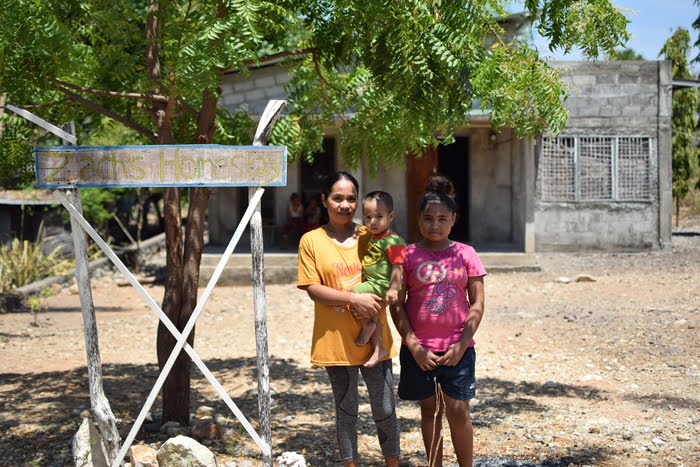
Once identified, the selected BTHA members visited the AHA on a learning exchange. This was a hugely important and empowering step for both communities and signified the start of an important working relationship between the two groups. The exchange included visits to other ecotourism business initiatives, to help the BTHA gather ideas for other community-based tourism opportunities.
Blue Ventures facilitated a workshop for the BTHA members to reflect on what they had learnt during the exchange, what they wanted to replicate or do differently from the AHA, and to identify other ecotourism activities that could complement and support the longevity of homestays within Beto Tasi. These ideas were consolidated into a business plan along with suggestions for skills training.
Plans are in place for members to learn about food preparation, hygiene and safety, and tourism safety. Blue Ventures also plans to introduce a community-owned online booking platform and to legally formalize AHA and BTHA
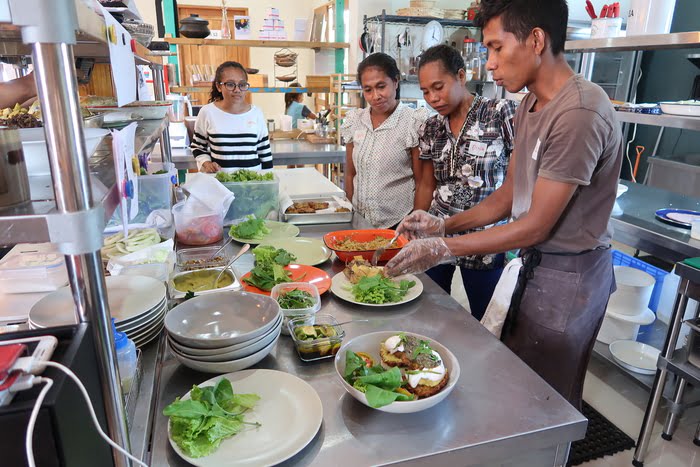
The Beto Tasi community is particularly committed to the idea of a Community Fund because it represents a scalable and innovative approach that will serve to both build resilience in local livelihoods, through greater diversity in alternative income opportunities, and restore ecosystems through sustainably funded and community-run conservation programmes. Members will commit 10% of all homestay/eco-tourism income in support of community development projects, eco-tourism micro-loans, and marine conservation and management activities.
The Beto Tasi Homestay Association welcomed domestic tourists from December 2020 until February 2021, when COVID-19 lockdowns began.
Community-run homestay associations reduce the pressure placed on fisheries to support the lives and livelihoods of the local community by providing reliable alternative income streams. This diversification strengthens the community’s resilience to unpredictable events and changes in supply, but it also empowers – by inspiring confidence and entrepreneurship throughout the wider community, particularly among youth.
Blue Ventures works closely with the communities to promote sustainable local conservation initiatives, highlighting the link between protecting local environment and the economic benefits of ecotourism. Building these relationships has prompted wider discussions on the importance of locally-led marine management and has led to increased community participation in other Blue Ventures conservation activities.
The income generated by the homestay associations is used to support school fees, and to supplement the cost of necessities such as food and clothing, with a percentage dedicated to supporting eco-tourism and conservation activities through the community fund.
Community-Managed Savings and Credit Associations (CoMSCA): ZSL, Philippines
ZSL Philippines, an international non-governmental organization focused on community-based conservation, has supported the establishment of 176 Community-Managed Savings and Credit Associations (CoMSCA) in the Philippines to date.
A local pool of capital allows members access to lump sums to meet predictable expenses, reduce shocks to vulnerable livelihoods, facilitate household cash flow management, and make short-term investments in income-generating activities. The simplicity of the CoMSCA system is reflected in the basic management structure and the low equipment needs.
The concept behind CoMSCA is to provide communities that do not have access to formal financial services with an opportunity to save and access small loans.
Community members organize into independent, self-managed groups that establish their own bylaws based on the internationally recognized Village Savings and Loans Association (VSLA) standards. These standards require that each group has 10 (min) – 25 (max) members and are timebound by proportionately sharing out equity every 52 weeks.
Members participate in CoMSCA by purchasing between one to five shares at each meeting. The cost of shares is set by the group and should be affordable enough for members to purchase at least one share at every meeting. Among the groups that ZSL works with in the Philippines, the cost per individual share varies amongst the groups at a minimum of PhP 50 (US$1).
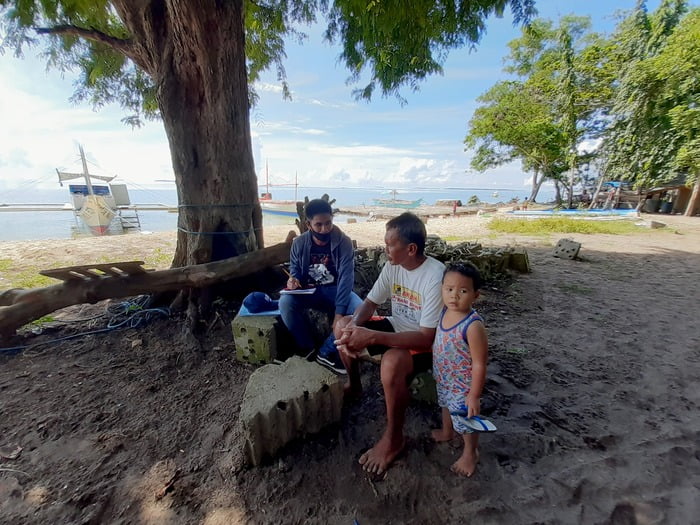
The collected savings are available to members through a loan fund from which they can borrow up to a maximum of three times the value of their individual savings input and the interest rate is agreed upon by the members at the start of each year.
CoMSCA has a conservation dimension too, as ZSL has encouraged the CoMSCA groups to establish an Environment Fund. Members contribute to this at each meeting, and at the end of the year collectively decide on an environmental project to invest in. Additionally, all public penalties collected for offenses such as littering and breaking the locally managed marine protected area (LMMA) regulations are added to the Environment Fund. ZSL has found this to be an extremely effective mechanism for promoting environmental responsibility and is looking at ways to encourage a focus on seagrass protection.
The group also has a social fund, which acts as a group safety net by providing members with a basic form of insurance to help meeting one-off unforeseen expenses, such as emergency medical costs or funeral expenses.
To date, over US$ 400,000 has been saved by the 1,996 members of the 176 CoMSCA groups ZSL Philippines has helped to establish. The income saved has been used to support a range of financial needs, such as purchasing new fishing nets, carrying out boat and home repairs, or investing in income-generating activities such as new business enterprises. Members also use CoMSCA loans to support the costs of sending children to school/college and to recover from natural disasters such as tropical storms.
Importantly, the CoMSCA method of savings and loans encourages communities to support each other by working together as a team. Women are empowered to lead groups, children are inspired by their parents to understand and embrace the merits of saving, and the wider community is encouraged to contribute towards the protection of their local environment and marine resources through the Environment Fund.
The Environment Fund, in particular, has had one of the greatest positive impacts by motivating and empowering communities to steward their marine resources and protect their local environment through self-financed conservation projects.